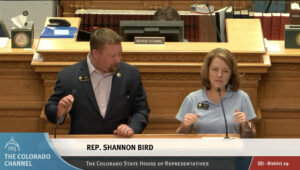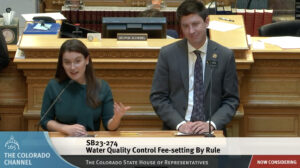Though Gov. Jared Polis couldn’t get the Colorado Legislature to pass the centerpiece bill to his affordable-housing agenda, he was able to cap a month of bill-signings on Wednesday with two bills that could further his goal of boosting the stock of housing in this state.
The Democratic governor signed House Bill 1255, which bars cities from setting arbitrary growth limits, and he inked HB 1189, which offers tax credits to employers who help contribute to workers’ savings accounts to buy homes. Those actions came two weeks after he signed Senate Bill 1, which will boost the state’s ability to sign onto public-private partnerships to develop land that it owns for workforce housing.
Those add to several tenant-rights bills that Polis signed Tuesday and Wednesday, including one that limits the size of deposits that apartment operators can charge to new residents, and to an earlier bill he signed to add transparency to the metropolitan districts that are building most of the new single-family housing along the Front Range. But that final collection of new housing laws coming from the 2023 legislative session is likely a quite different one than the governor, housing advocates, business groups or the influx of new Democratic legislators imagined when the session began this year.
A different slate of housing bills
Most notably absent from the final tally of laws is Polis’ land-use reform bill, SB 213, which would have removed obstacles to the proliferation of multifamily housing along key urban corridors and would have permitted owners of lots zoned for single-family housing to build accessory dwelling units and “middle housing” ranging from duplexes to six-plexes. That bill died on the Senate calendar during a stare-down between House members who wanted aggressive action and Senate members more comfortable with a study-focused bill in the face of local-government opposition to pre-emption of development codes.
Also not included in the final tally of housing efforts were the most aggressive proposals on tenants’ rights, including a bill to end the prohibition against local governments enacting rent-control laws that died in the Senate in April. Nor was there a bill to make Colorado the first state in the nation to grant local governments a right of first refusal to match the offered price for older for-sale apartment complexes, which Polis vetoed Tuesday to the gratitude of business groups fearing it could chill multifamily investments but to the anger of supporters who said it could have preserved below-market-rate housing.
Still, the bills going into law, especially the pair that he signed Wednesday, are expected to have a substantive effect on the affordable-housing crisis, in different ways.
Employer tax credits

Colorado state Reps. Ron Weinberg and Shannon Bird discuss their bill in the House to provide tax credits to employers who help workers save for home purchases.
HB 1189, sponsored by Democratic Rep. Shannon Bird of Westminster and Republican Rep. Ron Weinberg of Loveland, allows employers to open a savings account for employees to buy a primary residence and then offers them a tax credit for donating to the account. The 5% tax credit is capped at $5,000 per employee per year — meaning the employer can donate up to $100,000 annually per worker — and at $500,000 for all contributions in a year.
Daniel Ryley, executive director of the Arvada Economic Development Association, described the new tax credits to the House Finance Committee as a potential differentiator for employers at a time when many are facing labor shortages and competing to offer new attraction and retention tools. Rich Warner, president/CEO of Upstate Economic Development, said he believes that the savings accounts, if received well, could become a standard benefit offered by employers in a high-cost state, equivalent to a 401(k) or health insurance.
“Most Colorado businesses of all sizes struggle with employee recruitment and retention, citing housing affordability as their number-one concern,” Sen. Rachel Zenzinger, the Arvada Democrat who co-sponsored the bill in her chamber, told The Sum & Substance. “The structure of the bill will put more people in homes who would otherwise never reach that goal. And employers will benefit from the stability it helps create in their worker ranks.”
Division on the usefulness of housing tax credits
Zenzinger first floated the idea for HB 1189 at the Housing Colorado conference last year, and when she got a rousing reception, she teamed with the House sponsors to put it forward. The bill received both bipartisan support and bipartisan opposition.
During House debate, for example, Rep. Ken DeGraaf, R-Colorado Springs, called it a “wholly inadequate Band-Aid” for the affordable-housing problem, saying it could drive up costs by putting more money into the homebuying space without doing anything to increase supply. Weinberg countered, meanwhile, that it was a voluntary program that could allow employers to help their workers find housing in a new way, calling it “an absolutely bloody brilliant bill.”
“This is a great bill,” Bird added.
Growth limits

Colorado state Reps. Ruby Dickson and William Lindstedt explain to the House their bill to allow the Colorado Water Quality Control Commission to raise water-quality permitting fees. The same duo sponsored a bill to ban arbitrary growth limits in the state.
HB 1255, sponsored by Democratic Reps. William Lindstedt of Broomfield and Ruby Dickson of Greenwood Village, was meant to be a companion bill to SB 213 and remove the growth caps of 1% or some similar number imposed by cities such as Lakewood, Golden and Boulder. Those growth caps push housing out further from those employment centers, leading to higher costs within those cities, longer commutes for workers who must buy elsewhere and increased carbon emissions because of the commutes, Dickson said.
The bill, like SB 213, received opposition from local governments saying that it pre-empted their ability to determine what their communities will look like. But Democrats chose to back the idea anyway, despite it being Democrat-heavy communities that imposed such limits.
“We’re tossing these cost-increasing regulations into the dustbin of failed housing policies and are moving forward with bold solutions that will save families money,” Lindstedt said in a news release on Wednesday.
Public-private partnerships
SB 1 builds on efforts from recent years to catalog underutilized state land and buildings and determine if they can be sold or leased through public-private partnerships for other purposes, such as space for child-care centers.
In this case, the bill — also sponsored by Zenzinger along with Democratic Sen. Dylan Roberts of Avon – provides $13 million to jump-start such projects and enable the Colorado Department of Personnel and Administration to broker deals at about 55 sites statewide.
“Colorado is facing a housing crisis, and we must all work together to create more housing opportunities for every Colorado budget, not limit them,” Polis said in a statement following completion of his bill signings on Wednesday. “I look forward to continuing to build on the action taken this year to create more housing, save people money and ensure people have the resources they need to live and work in our state. I am particularly pleased that the local housing growth-restrictions bill, an important part of our more-housing-now goals, is now the law of Colorado.”
